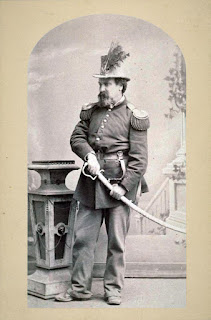Resident of San Francisco and at one point being one of the richest citizens of the city after some successful real estate speculation and commodities trades—though through over-estimating his acumen and downplaying the role of luck, overplayed his hand on a shipment of rice (due to a famine in China), precipitating a collapse in the market, Joseph Abraham Norton, originally from Deptford, England and growing up in South Africa, declared himself Emperor of the United States and Protector of Mexico on this day in 1859, coincidentally the anniversary of the signing of the US constitution in Philadelphia in 1787. After bankruptcy in 1852, unsuccessful in rebuffing his debtors, Norton faded from public notice as a business magnate and grew increasingly cynical about local and federal governance—launching a failed bid for congress. In his adopted hometown, however, Norton returned with a flourish first issuing a manifesto in the San Francisco Daily Evening Bulletin that broadly outlined the “national crisis,” in his summation, and how to address it, and second—in the same publication, decreeing:
 At the peremptory request and desire of a large majority of the citizens of these United States, I, Joshua Norton, formerly of Algoa Bay, Cape of Good Hope, and now for the last 9 years and 10 months past of San Francisco, California, declare and proclaim myself Emperor of these United States; and in virtue of the authority thereby in me vested, do hereby order and direct the representatives of the different States of the Union to assemble in Musical Hall, of this city, on the 1st day of February next, then and there to make such alterations in the existing laws of the Union as may ameliorate the evils under which the country is labouring, and thereby cause confidence to exist, both at home and abroad, in our stability and integrity.
At the peremptory request and desire of a large majority of the citizens of these United States, I, Joshua Norton, formerly of Algoa Bay, Cape of Good Hope, and now for the last 9 years and 10 months past of San Francisco, California, declare and proclaim myself Emperor of these United States; and in virtue of the authority thereby in me vested, do hereby order and direct the representatives of the different States of the Union to assemble in Musical Hall, of this city, on the 1st day of February next, then and there to make such alterations in the existing laws of the Union as may ameliorate the evils under which the country is labouring, and thereby cause confidence to exist, both at home and abroad, in our stability and integrity. — NORTON I., Emperor of the United States.
Orders and summons were ignored by the US congress and the armed forces, but Norton’s reign was received with tolerance and bemusement to genuine affection by some fellow residents who continue to embrace his legacy and even token recognition by the local establishments that Norton frequented that accepted his currency and even by the federal government that allowed him to enter his occupation as “Emperor.” A trust established in 1939 and continuing through the present day have petitioned naming the Bay Bridge in honour of Norton I, his imminence having suggested that a span be built linking Oakland and San Francisco as early as 1872.










